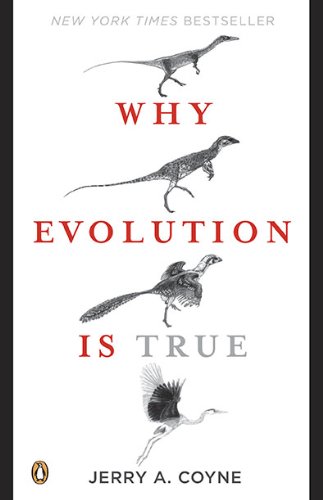Evolution Threatens Creationists Sense of Values
At this point I could simply say, “I’ve given the evidence, and it shows that evolution is true. Q.E.D.” But I’d be remiss if I did that, because, like the businessman I encountered after my lecture, many people require more than just evidence before they’ll accept evolution. To these folks, evolution raises such profound questions of purpose, morality, and meaning that they just can’t accept it no matter how much evidence they see. It’s not that we evolved from apes that bothers them so much; it’s the emotional consequences of facing that fact. And unless we address those concerns, we won’t progress in making evolution a universally acknowledged truth. As the American philosopher Michael Ruse noted, “Nobody lies awake worrying about gaps in the fossil record. Many people lie awake worrying about abortion and drugs and the decline of the family and gay marriage and all of the other things that are opposed to so-called ‘moral values.’ ”
Nancy Pearcey, a conservative American philosopher and advocate of intelligent design, expressed this common fear:
Why does the public care so passionately about a theory of biology? Because people sense intuitively that there’s much more at stake than a scientific theory. They know that when naturalistic evolution is taught in the science classroom, then a naturalistic view of ethics will be taught down the hallway in the history classroom, the sociology classroom, the family life classroom, and in all areas of the curriculum.
Pearcey argues (and many American creationists agree) that all the perceived evils of evolution come from two worldviews that are part of science: naturalism and materialism. Naturalism is the view that the only way to understand our universe is through the scientific method. Materialism is the idea that the only reality is the physical matter of the universe, and that everything else, including thoughts, will, and emotions, comes from physical laws acting on that matter. The message of evolution, and all of science, is one of naturalistic materialism. Darwinism tells us that, like all species, human beings arose from the working of blind, purposeless forces over eons of time. As far as we can determine, the same forces that gave rise to ferns, mushrooms, lizards, and squirrels also produced us. Now, science cannot completely exclude the possibility of supernatural explanation. It is possible—though very unlikely—that our whole world is controlled by elves. But supernatural explanations like these are simply never needed: we manage to understand the natural world just fine using reason and materialism. Furthermore, supernatural explanations always mean the end of inquiry: that’s the way God wants it, end of story. Science, on the other hand, is never satisfied: our studies of the universe will continue until we go extinct.
Notes:
Resistance to evolution is less about the theory and more about its moral implications.
Folksonomies: evolution culture creationism
Taxonomies:
/science (0.595398)
/science/social science/philosophy (0.550326)
/religion and spirituality (0.389131)
Keywords:
American philosopher (0.904853 (neutral:0.000000)), so-called ‘moral values. (0.903869 (negative:-0.616562)), philosopher Michael Ruse (0.901236 (neutral:0.000000)), family life classroom (0.887991 (positive:0.214811)), conservative American philosopher (0.870644 (neutral:0.000000)), evolution (0.839465 (positive:0.457060)), naturalistic materialism (0.807077 (positive:0.471884)), naturalistic evolution (0.779193 (positive:0.274730)), Creationists Sense (0.764925 (positive:0.413378)), naturalistic view (0.740725 (positive:0.633370)), moral implications (0.732472 (positive:0.413378)), American creationists (0.731018 (neutral:0.000000)), science classroom (0.727968 (neutral:0.000000)), Values Resistance (0.727808 (positive:0.413378)), profound questions (0.726057 (positive:0.709754)), history classroom (0.724660 (negative:-0.358926)), supernatural explanation (0.718872 (negative:-0.681304)), sociology classroom (0.718059 (neutral:0.000000)), emotional consequences (0.717161 (negative:-0.340396)), supernatural explanations (0.716293 (negative:-0.403114)), gay marriage (0.714783 (negative:-0.355629)), public care (0.711514 (negative:-0.344583)), fossil record (0.711373 (negative:-0.789246)), common fear (0.708928 (neutral:0.000000)), scientific theory (0.708698 (positive:0.207719)), purposeless forces (0.708515 (negative:-0.676273)), intelligent design (0.705804 (positive:0.557008)), Nancy Pearcey (0.701123 (negative:-0.272455)), physical matter (0.700174 (negative:-0.398086)), human beings (0.697721 (negative:-0.224538))
Entities:
Nancy Pearcey:Person (0.813809 (negative:-0.023651)), Michael Ruse:Person (0.606512 (neutral:0.000000)), gay marriage:FieldTerminology (0.554147 (negative:-0.355629))
Concepts:
Scientific method (0.964735): dbpedia | freebase
Creationism (0.948711): dbpedia | freebase | opencyc
Evolution (0.886513): dbpedia | freebase | opencyc
Intelligent design (0.856561): dbpedia | freebase | yago
Nature (0.785641): dbpedia | freebase | opencyc
Science (0.704571): dbpedia | freebase | opencyc
Universe (0.642298): dbpedia | freebase
Naturalism (0.637746): dbpedia | freebase





